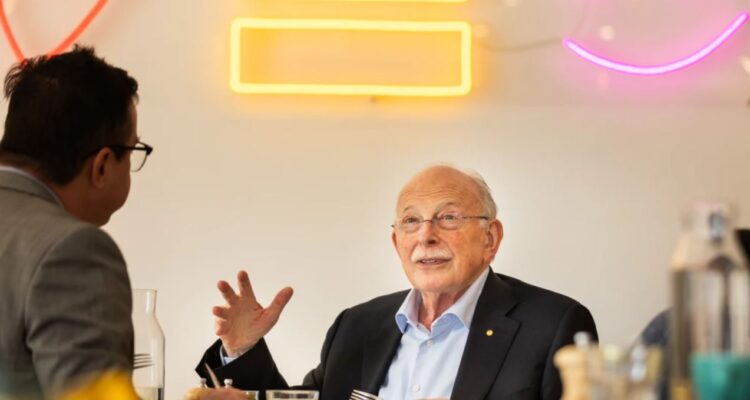When meeting The Powerbroker for lunch, it feels judicious to arrive early. But, of course, as I approach the corner cafe in suburban Balaclava, Mark Leibler (pre-eminent tax lawyer, corporate strategist, political activist and one of the world’s 50 most influential Jews, according to The Jerusalem Post) is already here.
But he’s not relaxing at a table. Through the window I can see he is standing in the middle of the room talking to a staff member. I wonder why.
Turns out he is pondering – on our behalf – as to which table might best suit the needs of The Age for our Lunch With interview and photograph.
Leibler, a man whose influence far exceeds his profile, is the most formally dressed person here. He wears a favourite navy-blue suit and expensive light blue shirt, accessorised with an Apple Watch and AC winking from his lapel. His black leather shoes are sensible, thick soled.
The art of journalism advises start with a gentle topic, but somehow we are straight into the Holocaust before we have even placed our order.
The Leibler family arrived in 1939 from Belgium, before the horrors of the Holocaust, when Nazi Germany and collaborators murdered 6 million Jews during the Second World War.
“Australia has outside of Israel the biggest Holocaust survivor community in the world today, at least when you look at the descendants of Holocaust survivors because not too many Holocaust survivors are actually alive any more,” says Leibler, who was born in Melbourne in 1943.
“Australia was pretty forthcoming in allowing refugees to come in at the time, and you know, a lot of people who’ve suffered so much harm in the Holocaust who … wanted to get away as fast as possible away from Europe. You can’t get much farther than Australia.”
Read the article by Stephen Brook in The Age.
[Editor: In the last paragraph in this trite article Leibler utters this throw away line, “Australia was pretty forthcoming in allowing refugees to come in at the time”. In fact this wasn’t really the case as revealed in this article about Government policy post war. I quote:
Responding to the anti-refo sentiments expressed before the war, the post-war Labor government secretly introduced bureaucratic measures to limit the number of Jewish Holocaust survivors permitted to enter Australia. These included restrictions on the percentage of Jewish survivors permitted on any particular ship leaving Europe to 25% of the total number of passengers. This quota was later extended to Jews arriving by air. Other discriminatory restrictions included a strict quota for Jewish arrivals to 3,000 per annum, even though the annual pre-war quota had been 5,000; exclusion of Jews from the mass migration programs, particularly the International Refugee Organisation which brought 170,000 non-Jewish Displaced Persons (DPs) to Australia; and in December 1949 what became known as ‘the iron curtain embargo’, which prevented privately sponsored immigrants arriving from countries behind the iron curtain, including Hungary and Poland where most Jewish survivors came from.]

